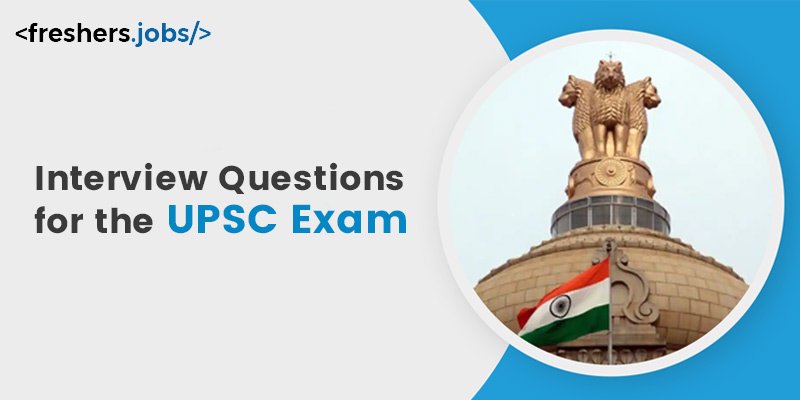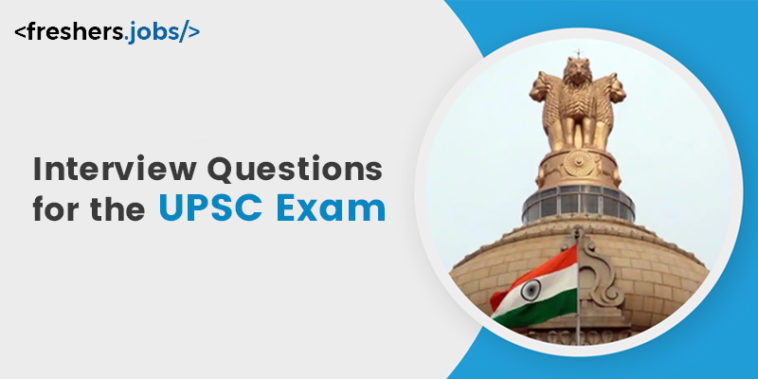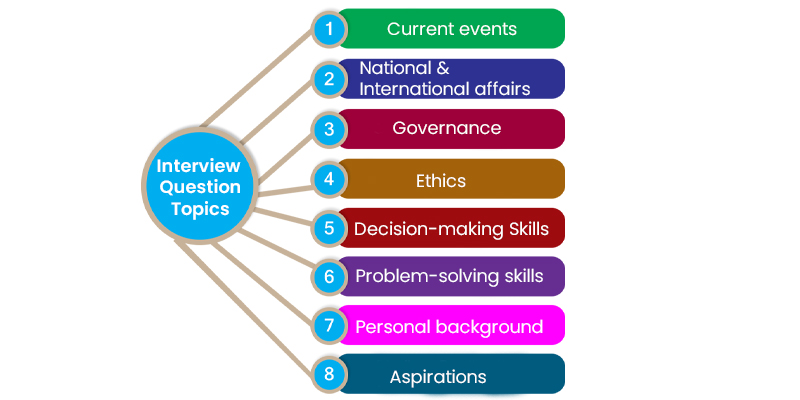The Indian Administrative Service (IAS) examination is widely recognized as one of India’s most important competitive tests. Annually, thousands of candidates attempt this assessment, but a mere 0.2% successfully secure a place in the final selection. To succeed in this examination, aspirants need a meticulously devised strategy, a solid knowledge base encompassing essential subjects and general awareness, notable interpersonal skills, and a comprehensive grasp of the examination’s format and process.

This blog will guide candidates who are seeking freshers jobs with interview tips for how to answer ias interview questions. It is essential to be familiar with the frequently asked question types to get ready for this interview. While the precise questions can differ, there are consistent themes and focal points that are typically explored.
What is an UPSC Interview?
IAS interview questions encompass a broad spectrum of Topics, such as
- Current events
- National and International affairs
- Governance
- Ethics
- Decision-making capabilities
- Problem-solving skills
- Personal background
- Aspirations.
By studying the experiences of previous interviewees, candidates can acquaint themselves with the nature and breadth of these questions. This exposure aids in the developing a comprehensive approach for effectively responding to such questions during their own interviews.
While some interview questions may match specifically to individual application profiles, it is essential to address them in a manner that aligns with one’s background and experiences. Additionally, reviewing UPSC Previous Year Question Papers can provide insight into the complexity level of questions in the upsc interview process.
If you are in search of job opportunities in Pondicherry, you can look for job openings available in that city. Visit fresher job openings in Pondicherry to find job positions that are relevant to your skills and abilities.
Sample Questions and Answers
Through raising questions from various domains, the interviewer aims to assess the candidates’ knowledge, ability to express themselves, and intellectual thinking. It is vital to respond honestly and confidently, as the interview panel is seeking individuals who can authentically serve the people of India. The IAS interview, encountered by aspirants of the Civil Services, involves a consistent pattern of questioning, typically aligned with the UPSC Syllabus.
Questions on Introduction: The initial part of the Interview is the self – introduction of the candidates. It is vital for the candidates to prepare alternate patterns of ways to answer these ias interview questions. Here are some of the Self-Introduction questions given below.
- Can you tell us about yourself?
- What are your Strengths and Weaknesses?
- What made you aspire to pursue Civil service?
These questions will give clarity about your background to the Interview panel. So, make sure that your answers are brief yet informative. Ensure that you cover all the necessary points.
Questions on Education: The next part of the interview is questions about the candidate’s Educational Qualification which plays a significant role in unleashing the knowledge of the Candidates.
- Could you elaborate on your Educational qualification?
- Can you tell us about your favorite subject?
- What kind of project did you do during your graduation?
This part of upsc interview is very important for the interview panel to recognize your knowledge regarding your Educational qualification. So make sure you are prepared well to answer these questions. Be honest and confident while answering.
Questions on Current Affairs: In an IAS Interview, it is necessary to be aware of the Current affairs. The questions will be asked like,
- Could you tell “what today’s top headlines are?”
- What are the primary economic challenges that the nation is currently confronting?
- What are your thoughts regarding the recent modifications to the education system in the country?
IAS interview questions typically revolve around general subjects. Therefore, staying well-informed is important, which involves keeping up with newspapers, news broadcasts, and radio updates to stay up-to-date on daily developments. It’s essential to possess an understanding of current affairs as well as staying updated on the latest technologies and trends.
Questions on Optional Subject: Interviews will ask questions related to your chosen optional subjects during the interview, so it’s essential to be well-prepared for such inquiries. Here are a few examples.
- What influenced your choice of selecting the “XYZ” subject as your optional?
- Could you explain the reason for not opting for your undergraduate subject as your optional choice?
- In what ways will your expertise in your optional subject be advantageous in your role as a civil servant?
- How do you intend to utilize your knowledge of your optional subject to address developmental challenges in India?
- What are your plans for integrating your optional subject with your core responsibilities as a civil servant?
Questions on Hobbies: In an upsc interview, the interview panel may delve into the hobbies and interests you’ve indicated in your Detailed Application Form. For example, if you’ve mentioned sports as a hobby, expect questions pertaining to sports, and if reading books is one of your interests, anticipate inquiries about the most recent book you’ve read and the insights you’ve derived from it. It’s essential to be ready to provide a more in-depth discussion about your hobbies and interests during the interview.
- Can you tell me about your hobbies and how you pursue them?
- How do you think your hobbies can be relevant to your work as an IAS officer?
- Can you give an example of how your hobby has helped you in your personal or professional life?
- How do you stay updated and informed about developments in your area of interest?
Adobe offers a wide range of job vacancies for freshers. Interested Candidates can click on Adobe Jobs For Freshers to apply for various job roles relevant to their skills and abilities.
Challenging UPSC Interview Questions
The ias interview questions are renowned for its demands and challenges. Here are a few instances of tricky questions posed during the IAS interview, along with potential responses provided by candidates who successfully navigated them:
- Given the choice, would you opt to be an honest IAS officer in a corrupt environment or a corrupt IAS officer in an honest system? Please explain your preference and reasoning.
“As a prospective civil servant, my main objective is to dedicate myself to the service of the nation while upholding the values of honesty and integrity. Although it will be challenging to be an honest IAS officer in a corrupt system, it offers the potential to initiate gradual transformation and contribute to positive change over time.”
- What are your thoughts on the commercialization of education?
“Education plays a major role in the improvement of the future of a nation. While private institutions have contributed to expanding access to education, the commercialization of education raises concerns about affordability, quality, equal job opportunities, etc. It is essential to strike a balance between private investment in education and ensuring that education remains accessible and affordable for all. Government regulations and quality control measures can help address the negative impact of excessive commercialization and ensure that education continues to be a tool for empowerment.”
- What approach would you take when faced with a situation where your personal convictions clash with official government policies?
“As a civil servant, my foremost responsibility lies in upholding the Constitution and executing government policies in the best interest of the nation and its citizens. Nevertheless, should I encounter a scenario where my personal beliefs clash with government policies, I would address the situation with an open mind, aiming to achieve a harmonious resolution. This would involve initiating conversations with pertinent parties, articulating my reservations, and examining potential avenues that reconcile the government’s goals with my individual principles. My ultimate aim would be to discover a balanced approach that upholds the tenets of justice, equity, and collective welfare.”
Some other important ias interview questions which can be asked in a tricky way is,
- If you were granted the authority to modify one aspect of our nation, what would it be?
“If I were granted the authority to alter one aspect of our nation, I would choose to reform our education system. By reshaping our educational framework, we can provide our youth with better opportunities, narrow socio-economic disparities, and establish a solid base for national advancement. My primary objectives would encompass promoting research, innovation, and a values-based education. Enhancing the overall standard of education at all levels would also be a key focus. This transformation would yield far-reaching benefits, influencing various factors of our society, including the economy, governance, and the general welfare of our people.”
- How do you manage and respond to criticism or feedback?
“When faced with criticism or feedback, my approach is to remain open-minded and composed, responding with respect. I consider it as an opportunity for learning and personal growth, taking proactive steps to improve myself and engaging in self-reflection. I perceive feedback and criticism as valuable experiences that contribute to both my professional and personal development. I make a conscious effort to maintain an attitude of receptiveness, recognizing them as valuable insights to enhance my knowledge and skills.”
- Do you believe that reservation policies retain their relevance in contemporary India?
“Reservation policies were implemented with the aim of ensuring equal opportunities and social equity for historically marginalized groups. While considerable advancements have been achieved, certain disadvantaged communities still encounter socio-economic obstacles and discrimination. Consequently, I hold the view that reservation policies remain pertinent for fostering inclusivity and equalizing opportunities. Nevertheless, it’s equally important to periodically reassess and refine these policies to adapt to evolving social dynamics and uphold the principles of meritocracy.”
In conclusion, IAS interview questions include a wide range of subjects, including current events, national and international affairs, governance, ethics, decision-making capabilities, problem-solving skills, personal background, and aspirations. So, it is important to be aware of all these subjects to answer the questions. So, in this blog, we explored what are the ias interview questions and how to answer them.




